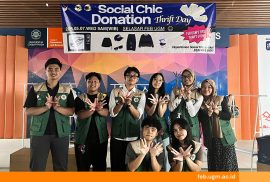Tourism indeed often brings economic growth to local communities, but on the other hand, it cannot be denied that tourism also sometimes has the potential to have a detrimental impact, especially when tourists behave unethically. For example, it may be familiar to us to find garbage scattered carelessly and vandalism in tourist areas. In many cases, the perpetrators of these acts are tourists visiting the area itself. Of course, the government and the local community have made various efforts through regulations and appeals to tackle the unethical behavior of tourists. However, the reality is that these efforts have not yet been fully implemented optimally and effectively, so support for other efforts is still needed.
Previous research has found that tourism service providers who build rapport with consumers can encourage positive consumer behavior. Based on this, a study was conducted to find out whether tourism service providers’ rapport with tourists can also reduce their unethical behavior. Service provider rapport itself refers to the enjoyable interaction perceived by consumers towards personal connection with service providers (Gremler and Gwinner, 2008). The process and the results of the research were then written into a journal article entitled “Ethics support through rapport: Elaborating the impact of service provider rapport on ethical behavior intention of the tourists” by Widya Paramita, Naila Zulfa, Rokhima Rostiani, Yulia A. Widyaningsih, and Mahfud Sholihin.
Using the Broaden-and-Build Theory of Positive Emotions, the research in this journal article further empirically tests the influence of tourism service providers’ rapport on the ethical behavior intention of the tourists. Besides that, this research also specifically examines the role of tourism service providers in shaping ethical behavior and reducing the unethical behavior of tourists. This theory states that positive emotions including happiness will encourage broader and abstract thinking so this study intends to examine whether the happiness that comes from interactions with tourism service providers can increase moral identity, moral justification, and intention to behave ethically.
The method used in this study is an online survey with the aim of respondents to people who have traveled in the past year. Respondents voluntarily participated in the study and were screened based on their recent tourism activity or in the past year to control for the post-COVID-19 effects and to ensure that they can remember their tourism experiences accurately. After answering the screening questions, respondents were asked to answer questions related to the research focus, namely service provider relationships, happiness, and moral identity, respectively. The research team asked respondents to recall their travel experiences, especially their interactions with tourism service providers. Then, respondents answered questions about moral identity, moral justification, and intention to behave ethically. In addition, regression analysis of mediation and moderated mediation were used to test the variables by using Hayes’ micro-process software.
Based on the results of the analysis, the researchers found that service providers who build rapport with tourists can bring tourists happiness and increase their moral identity because moral identity will increase moral justification and intentions to behave ethically in tourists who travel. Therefore, the tourism industry is advised to empower service providers in the tourism sector to encourage ethical behavior intentions of tourists through increased happiness, moral identity, and moral justification. The results of another study found that service providers who build closeness with tourists not only increase tourist satisfaction and business profits but are also able to provide moral support to tourists to behave ethically in tourist attractions. So let’s create more happiness to encourage ethical behavior!
—
Author of the Paper: Widya Paramita, Naila Zulfa, Rokhima Rostiani, Yulia A. Widyaningsih, and Mahfud Sholihin.
Published on Journal of Retailing and Consumer Services, Volume 63, November 2021, 102693.
Link https://www.sciencedirect.com/science/article/abs/pii/S0969698921002599




